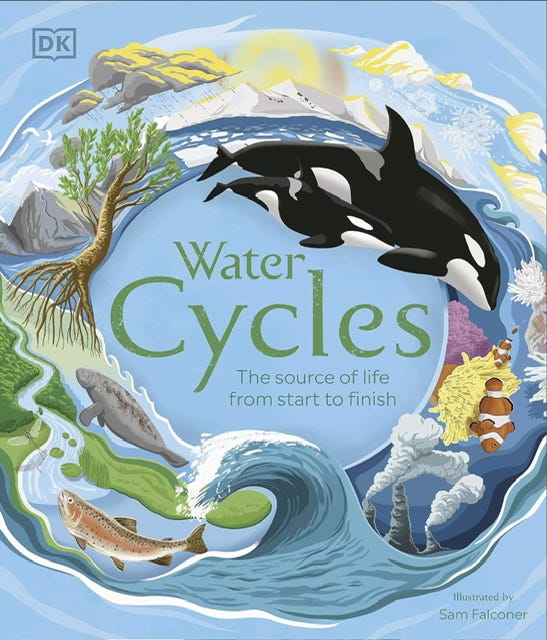How we homeschooled today #86
The science of salt, and the unstretchability of time
I woke up horribly early, unintentionally, and listened to a fascinating podcast about plankton. I’ve been telling everyone plankton facts all day and could easily make this entire post about plankton, but I’ll restrict myself to three cool facts:
The words ‘plankton’ and ‘planet’ have the same Greek origin: planasthai, to wander. Planets wander through the sky, and the defining feature of plankton is that it wanders—plankton cannot swim against currents, it has to drift with them. This means—are you ready?—that jellyfish are plankton!
Every time you inhale, half the oxygen you breathe in was produced by algae—single celled phytoplankton, so small you could fit 100 of them on the width of a human hair. Tiny plants, photosynthesising just like the biggest trees.
You may well know about phytoplankton—plants—and zooplankton—teeny tiny animals. But did you know that there is a third group, that we’re discovering more and more of, that is halfway between the two? When light is available, this group photosynthesises, so getting their energy from sunlight. When it’s not, they eat other animals, like some kind of weird alien hybrid nightmare. (Mixotrophic plankton, if you’re interested. From Greek trophe, food.)
The children have been playing with their Kapla planks all day. This makes a welcome change from Lego, but it’s driving me crazy. The nature of building with planks is that your structures sometimes fall. And every time they fall, somebody howls with rage and frustration. At the moment I want to burn the planks, but hopefully a good night’s sleep will remedy this. The plank games also involve lots of maths cubes. There isn’t overt mathematics going on here, but I like to think there’s some subliminal counting and pattern-making going on. (Also, they are excellent for encouraging dexterity in little hands.)
This morning’s work was:
Spelling
More maths workbooks, this time Addition and Subtaction.
Me reading aloud more pages from Water Cycles, which today was about water fleas, periwinkles, tides, and ichthyosaurs. The tide explanation was particularly clear, and I now understand it properly for the first time.
Our morning stack, as Eloise Rickman calls it, is a bit off this week. I’ve realised that we’ve added in the non-fiction reading, which we’re really enjoying, but the children don’t seem to have the stamina to add it on top of the usual work, so instead it has displaced it. This is why languages are lagging behind this week. Also we’re doing slightly more maths than usual, just because the children are keen on it at the moment. How to handle this? I don’t know. Work after lunch never seems to happen—if it hasn’t been done before lunch, it probably won’t be done at all. Perhaps move the reading to the afternoon? We’ll see. Just when you think you’ve got it all figured out, eh?
After lunch they grudgingly agreed to do some work in their Jolly Learning books, handwriting practice for my son and learning about common nouns for my daughter. (I know I just said work never happens after lunch. Today’s experience confirmed me in that opinion.)
Yesterday we read about the Dead Sea, and the children said they’d like to do some salt experiments. Today we investigated how things float on pure water versus salty water, and I explained the chemical process that happens when salt dissolves into water. The children were completely baffled. My husband explained it a different way, potentially with more success.
That’s it for today, but I’ll add any additional reading in later and share via Notes.
Updated: Alfred the Great at teatime, and more Beverly Cleary and Flat Stanley in bed.
A woman and a genius? Surely not!
My husband’s latest post is all about John Stuart Mill, or more accurately about his wife, Harriet Taylor. JS Mill is one of the heroes of the nineteenth century—an ardent campaigner for social reform and particularly for equality of the sexes. His work is still quoted everywhere today, and his arguments are cited by both left and right ends of the political spectrum.
Mill called Harriet a genius, and his most influential works were essentially written as a partnership with her. But Harriet has been consistently ignored, and her genius swept aside; according to biographers, Harriet batted her eyelashes and Mill fell to pieces, losing his fabled intellectual judgement. She couldn’t possibly be a woman and a genius, could she?
I’ve been reading
’s posts about trad wives, soft girls, and stay-at-home-girlfriends recently and thinking, what ok earth would Harriet make of all this? Jo and so many other of my favourite women writers on Substack owe Harriet a huge debt of gratitude, but Harriet has been consistently overlooked and underestimated.Henry’s here to set the record straight. I’m obviously biased, but I think this is one of his best pieces. It’s also a tragic love story. What more could you want?
Thanks for reading! If you’re not a subscriber, sign up for free and never miss a post.





